Celebrating the passion, dedication and personal stories of Social Ecology faculty, staff, students, alumni and benefactors, “The Dean Asks…” is a feature in which Dean Valerie Jenness interviews people inspired by the pursuit of excellence and encourages participation in interdisciplinary education to solve complex societal problems. Over the next year, please check back to read or listen to additional installments. View Archive
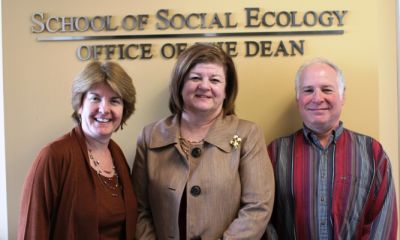 Valerie Jenness, Dean of the School of Social Ecology, and David Feldman, Chair of the Department of Planning, Policy and Design, interviewed alumna Joan Patronite Kelly ‘77 about her memories as a student in Social Ecology and her current business endeavors and contributions to the community. Joan serves on the PPD Advisory Board and is an advocate for the School of Social Ecology. Her company, BonTerra Consulting, is identified by the Orange County Business Journal as one of the Top 40 Largest Women-Owned business in Orange County.
Valerie Jenness, Dean of the School of Social Ecology, and David Feldman, Chair of the Department of Planning, Policy and Design, interviewed alumna Joan Patronite Kelly ‘77 about her memories as a student in Social Ecology and her current business endeavors and contributions to the community. Joan serves on the PPD Advisory Board and is an advocate for the School of Social Ecology. Her company, BonTerra Consulting, is identified by the Orange County Business Journal as one of the Top 40 Largest Women-Owned business in Orange County.
Val: Looking back at your time at UCI and as a student in Social Ecology, what experiences had a strong impact on your life?
Joan: In reflecting on my years, you get those little vignettes running through your head and one of them was that I had a professor that just did a phenomenal amount for my ability to work one-on-one with a professor, which I hadn't done a lot of up until then. I took every single class that was offered with him. It was John Ottensmann, and I don't know if anybody even recalls that name, but he had a specialty in urban housing and did a lot of work in large urban areas prior to becoming an associate professor. He was somebody I often wonder what happened to. He was just so inspiring.
Val: What did he do that enabled you to be inspired by him? What qualities or characteristics did he have?
Joan: He made things real. Instead of talking about policies or theories, he talked about his on-the ground experiences and how he dealt with problems. Even in talking about case studies in housing that he wasn't a part of, he was able to interject his own experiences. I hadn't planned on working in housing at all--I wanted to be a planner. But my very first planning job was with the City of Pomona. And the city came under fire from HUD because they were getting community block grant dollars that required them to provide low-income housing. Pomona thought they had more than enough low-income housing and really didn't need to do anymore, therefore their block grant money was going to go away. I just raised my hand and said, “I'll set up a program.” It was something I learned at the university--take advantage of opportunities. From a career standpoint, this was one of the most phenomenal opportunities I ever had because I was still in the master's program, working part-time, and now I was setting up the City of Pomona Housing Authority. It goes back to the professor that inspired me. I don't know that I would have the gumption to raise my hand at that point if I had not had those experiences explained to me by the professor.
David: Can you tell me about a few memorable experiences you had while at UCI?
Joan: I give credit to Dr. Stokols’ class, which was when I first thought about environment meaning everything around you. It seems very simple now, but at the time that was pretty out on the edge thinking--the environment is indoor space as well as outdoor space. This concept really made me look at things very differently. Stokols really activated something in me that I had not thought of prior to that, which is the space you're in really affects a lot about how you learn, your attitude, mood and how you interact with others.
Val: Dan Stokols has that unique ability to see those as interdependent systems--built environment, natural environment, human beings and how they are put together. I think that is one signifying feature of Social Ecology.
Val: How did you decide to study planning and knew you wanted to pursue it as a career?
Joan: My father was a planning commissioner. I would sit at the dining room table with him going over his agendas and often we would have arguments about the design of a space or an application for a Conditional Use Permit (CUP) or something like this. I think it really pleased my father when I decided to study planning and then he loved it when I started my company.
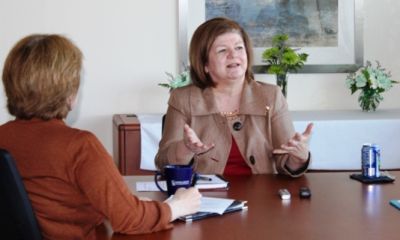 Val: Have experiences that might have seen uneventful at the time come to be more meaningful over time?
Val: Have experiences that might have seen uneventful at the time come to be more meaningful over time?
Joan: There is an instance, in a large lecture class in Social Ecology where we had just taken a midterm and I had received a C. I compared my answers with a fellow classmate and the answers were similar and he had received a B+. I spoke to the Professor and he said that he had a lot of different TAs grading the papers and I needed to get over it. I carried on my fight by talking to the Vice-Chancellor and we had a very long philosophical discussion about grades and schooling. After the conversation, I had a completely different attitude. I learned that it was important to stand up for myself and if there was a wrong, I needed to carry it forward. I learned so much in all of this.
Val: You were working and attending graduate school in Pomona. When did you come back to Orange County?
Joan: I was running two offices, housing and advanced planning. After 3 years I approached my boss, a senior planner, and asked for a promotion. Up to that point, there had been no title changes or pay increases. The Planning Director talked to the City Manager on my behalf, but I was told that there were no discretionary funds for pay increases. Therefore, I looked for another job and was hired by VTN, an Orange County engineering company that also did environmental work. At my going away party, the City Manager came up to me and said that they hated to lose me. It appears that the Planning Director never spoke to him about a promotion or increase in pay. He had a problem with women and didn’t know why I was pursuing a career. This was in the 1980’s.
David: We’re interested in what you’re working on these days, including learning about some of your current passions and projects. With this in mind, what are your core values that shape how you engage in the world?
Joan: I think that foremost--and this was something that was drilled into me as a child–is whatever you do, do it with integrity. Whether you fail or succeed, your moral standing should not be compromised. One of the other things that I have learned is that moderation is important. This has become apparent to me in the environmental field. Lastly, I have learned that everyone is capable of accomplishing almost anything, if they want it badly enough.
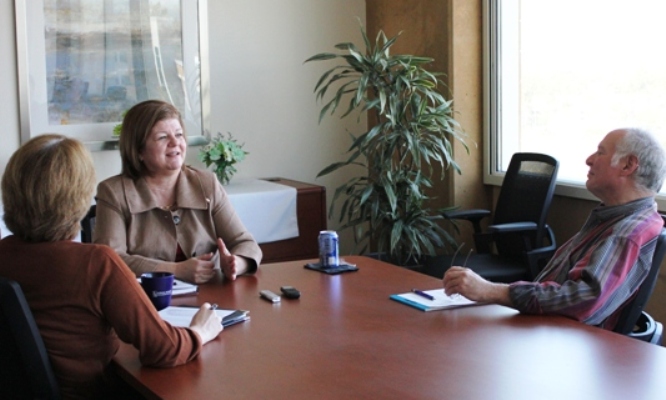 Val: How did you come to be the person responsible to make payroll for other people, responsible to uphold regulations about environmental impact, and responsible to a business community that needed to grow?
Val: How did you come to be the person responsible to make payroll for other people, responsible to uphold regulations about environmental impact, and responsible to a business community that needed to grow?
Joan: I have worked in the field since 1977, but have not had a lot of job changes. I worked for the City of Pomona, VTN and went to Michael Brandman Associates for 12 years. It was time for me to move on to something new. I started Bonterra in August 1996. It was very risky. It was at the end of a recession. It turned out to be an opportune time to start a business because the economy was bouncing back and we were doing things very affordably. I had six sleepless months but we made a profit our first year.
Val: Could you give a brief description of your company?
Joan: The company has almost 60 full-time employees and about eight part-time employees. We are an environmental consulting firm that assists clients with environmental regulations, primarily the California Environmental Quality Act (CEQA). We have wildlife biologists for biological regulatory work. We have a cultural resources department that does archeological and paleontological reviews of the site, one is an adjunct professor here--Chris Drover. We do habitat restoration and we have a department called Regulatory Compliance that assists clients in getting permits for various projects. We just made the Top 40 Women-Owned Business list in the OC Business Journal that just came out. We have not made that cut before.
Val: Could you tell us how you continue to engage with the students in the MURP (Masters in Urban and Regional Planning) program?
Joan: One exciting thing we did was host a MURP student meeting at our company office. I had my department managers give a presentation on what our company does. It was really well-received. Our staff really enjoyed talking directly with students and learning about their interests. I also enjoy sitting on the PPD Advisory Board. Students attend our meetings now because they want input from people on the board. I think this is great!
David: Given what you’ve learned over the span of your career since graduating from UCI, is there anything you’d advise current students to study or focus on to become better prepared for the challenges of today’s world?
Joan: When we hire students, we work closely with them in just the breaking down of a problem. We focus on how you break that problem into pieces so you’re making sure that you cover all aspects of the problem. There is always an easy answer to a problem, but you have to make sure that whatever you choose to do, there are no secondary impacts. This relates to the environment, too. It’s an interrelated, working system where there has to be a good balance. As humans imposing ourselves outside of our environment, in many instances we make a lot of mistakes, but I think that we have to think things through as deeply as we can.
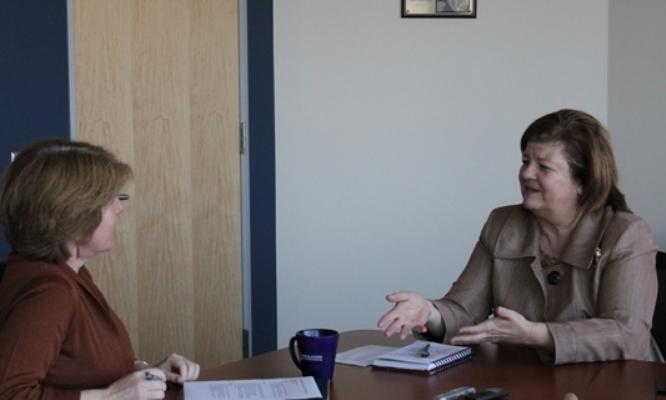 Val: Joan, you have an amazing ability to communicate across constituencies. How can we try to teach this skill to our students?
Val: Joan, you have an amazing ability to communicate across constituencies. How can we try to teach this skill to our students?
Joan: Communication is both oral and written. It is a fundamental part of getting a point across. That is basically what I do. I break down the problem and communicate with the decision--making body what the issues are and how to best rectify them. If there is a breakdown in the communication process, then the plan falls apart. Whenever I interview people for jobs, I always ask for writing samples to see how they communicate a problem or policy.
Val: What most pleases you about UCI’s trajectory to this point?
Joan: I have observed how UCI has worked very hard over the years to connect with the community. When I was a student here, there was absolutely no connection. The University now has a number of supporters in the community, who see the value of the University for what it does for Orange County and Southern California. Social Ecology in particular has gone a step further into the community by helping those in need through programs such as the Community Outreach Partnership Center (COPC), as well as the research outreach series through The Newkirk Center.
Val: What concerns you the most about the trajectory?
Joan: My biggest concern is the budgetary issue. It’s not confined to just UCI but to the whole state system. My worry is that we will get to a point where very deserving students will not be able to go to college because they will not be able to afford it. When you work down to the level of the School, I don’t know that I have any concerns. Social Ecology is a great program and a great place to be. I have recommended it to several colleague’s kids. I think it's an amazing degree because you're exposed to so many things and there is very little that you're prevented from doing later in life with a start in the program.
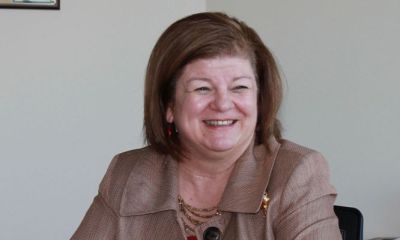 Val: With over 20,000 Social Ecology alumni, what form should engagement with our alumni take? What should we be doing more effectively?
Val: With over 20,000 Social Ecology alumni, what form should engagement with our alumni take? What should we be doing more effectively?
Joan: I do have some thoughts. One of the phenomenal things Social Ecology does is community work, and I don’t think it gets enough credit or exposure for this. If Social Ecology put a call out to alumni to be involved in community projects, you would get a lot more people volunteering than you might expect. Alumni like to give back in ways that aren’t necessarily financial support. A lot of the alumni are still local and it’s a great way to get them back to the campus. Another thing is to have a reunion with graduates from the School.
David: So, if someone in the greater OC community was to ask you: “Joan, what is Social Ecology and how did it help you become the person you are today,” what would you say?
Joan: Social ecology, in my definition, is the inner workings of man with his environment in the broadest sense of the word. There isn’t a person alive that can’t relate to that in some aspect. It’s made me think differently. It has made me think about how I can better relate to people, to the world, and- how to make my path smaller. I thank you for that.